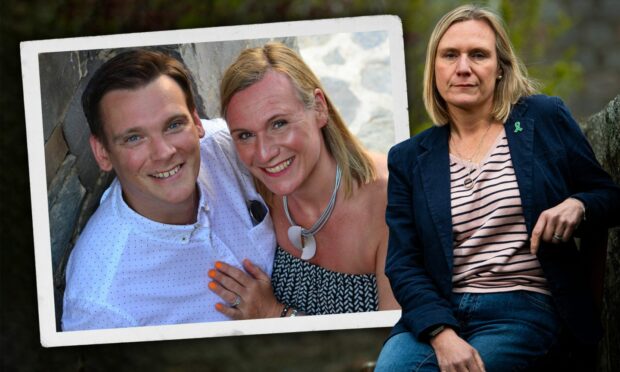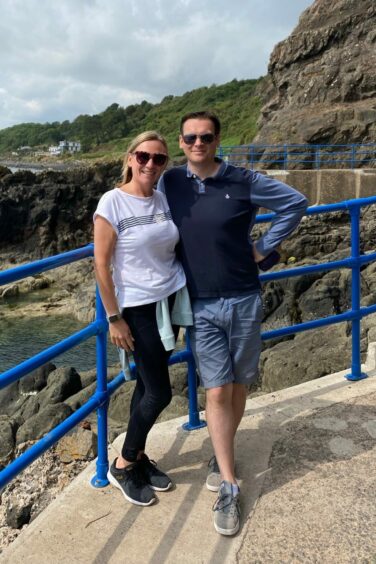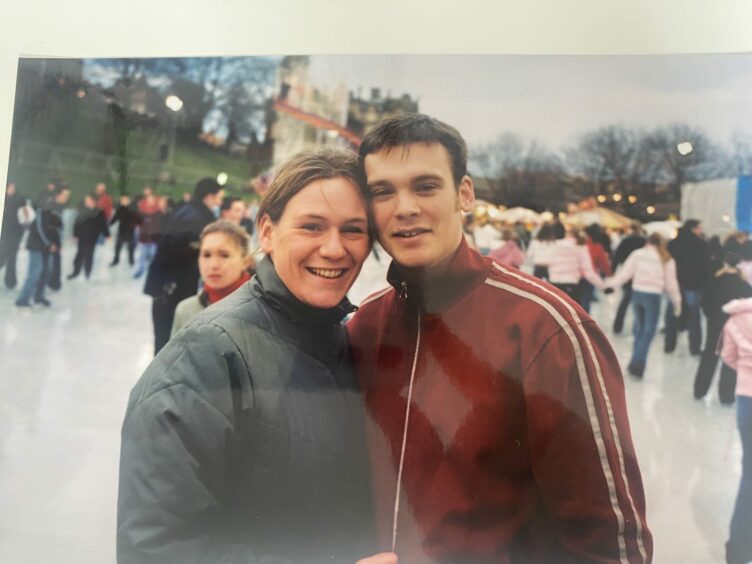Karen Scaife has a video on her phone of her husband Ross.
The 40-year-old father of two is at a Stereophonics gig at Aberdeen’s P&J Live in March last year.
He’s not in the footage, which was taken by his brother. Instead, the camera is trained on lead singer Kelly Jones easing the crowd into the first chords of the band’s 1997 hit Traffic.
You can hear Ross, though. A life-long fan of the Welsh band, he is behind the camera whooping in delight.
Hours after the video was taken, Ross went missing. Two days later, police found Ross’s body in Kirkhill Forest where he had taken his own his life.
More than 12 months on, Karen is still riven with grief over the loss of her husband, a quiet man who could light up a room when he spoke and was loved beyond measure by his friends and family.
And she is left trying to comprehend the chasm between the Ross she knew – the one in the video shouting with joy – and the hidden version of Ross that out of the blue decided to end his life.
“He just went out to have a good night with his brothers,” Karen says.
“When he left the house that weekend, never in a million years did I think it was the last time I’d see him.”
The questions left behind by tragedy
Karen says she will never know why Ross took his own life.
For her the saddest and scariest part is how he had masked his mental illness from friends, work colleagues and family – and even from her.
Like many people, Ross struggled with his mental health, and had received professional help. It was also something he had talked about with his friends, sharing stories of ups and downs.
But, says Karen, “never, ever, ever did I think – and I don’t even think he knew – that he was mentally unwell”.
Karen is now on a mission to help ensure the devastating consequences of Ross’s hidden illness do not happen to other families.
In the weeks following Ross’s death, she launched a campaign to support men’s mental health and child bereavement and raised almost £21,000.
A charity ball to remember Ross Scaife
Last month, she and the family held a ball to remember Ross and raise money for mental health as well as boost awareness.
Alongside raising £27,000, the White Feather Ball aimed to open the conversation about mental health – attendees were encouraged to share how they feel and ask for help when they need it, and support others to do the same.
Proceeds from the ball will go to the Scottish Association for Mental Health (SAMH) to support their work in suicide prevention, the Sunrise Partnership to help them in supporting children and young people through loss and bereavement and Aberdeen Football Club Community Trust (AFCCT) to support their work in improving the well-being of the local community.
As part of her campaign, the message that Karen wants amplified is that mental health is not ‘in your head’. It is real, and not something to hide or deal with on your own.
“Ross would say ‘yeah I’m ok’ maybe in an effort to convince himself that he was ok and how he was feeling was just down to a bad or stressful day, work pressures or maybe even stuff that was just going on in the outside world,” Karen says. “But actually it was much deeper than he or any of us understood.”
Meeting in Edinburgh, and building a life in Aberdeen
Karen and Ross met in Edinburgh in 2003. Karen, originally from just outside Belfast, was an events co-ordinator in the city helping to organise that year’s European Cross Country Championships.
Ross, a student at the time, was an Energizer battery.
“It was part of an event sponsorship,” Karen explains. “His job was to walk around Holyrood Park dressed as a giant battery. And that’s how we met.”
Six months later they moved in together and for four years lived a dream life in the capital. Through Karen’s job, the pair got free tickets for festivals, allowing both of them to indulge in a shared love of music.
They loved sport, too, albeit different games. Karen likes rugby while Ross was a football fan, so they would go to the Golf Tavern next to the Meadows, which showed both. When the rugby finished they’d watch the football on the other screen.
In 2007, the couple moved to Aberdeen for Ross’s oil and gas job. His family are from Dyce, and they lived there for a decade before moving into the city in 2018.
In that time Erin and Owen were born. Ross was devoted to the children, now 13 and 11. Karen called him the “baby whisperer” because of his magic touch with them when they were little.
“We had a great life, a nice house close to family, and an amazing circle of friends,” Karen says. “The kids were happy, and we had good jobs. Life was good.”
What happened to Ross Scaife after Stereophonics gig
Ross was so excited about going to the Stereophonics gig.
During the lockdown, he’d video call with friends and play the band’s songs on his guitar along with music by other favourite artists including Neil Young, Green Day and Radiohead.
He’d seen the Stereophonics play many times when they were still up-and-coming – in Aberdeen venue Drummonds, for example, and the small tent at T in the Park in 1997.
At the P&J Live, unleashed on a much bigger venue, the band were ringleaders of an Aberdeen celebration, and Ross bounced along to the songs with his brothers and thousands of fellow fans.
What happened next is unimaginable. At about 10.30pm, Ross got separated from his group and didn’t show up at a pre-determined rendezvous.
“When his brother called me to let me know that’s when we knew something’s really not right here,” says Karen.
‘I just needed to look him in the eyes’: The search for Ross Scaife
Over the next 36 hours police and an army of searchers – family, friends and others – hunted through back gardens and sheds in the area desperately looking for him.
At home, Karen waited.
“I just felt really confused, and helpless,” Karen says. All she wanted was for him to walk back through the door.
“I just needed to look him in the eyes and tell him it’s okay, we’ll find a solution. But I never got the opportunity to do that.”
Ross’s body was found at 11am on Tuesday morning. Karen had been dealing with the police all the time Ross was missing. But when two officers she hadn’t seen before showed up at her door she knew instinctively what they were going to say.
“It’s just a surreal thing to have to do,” she says. “To tell your children that their dad has died and in such circumstances.”
‘Maybe this was something inside him all of his life’
Karen says that if she can prevent even one more family tragedy, she will have done something worthwhile in Ross’s memory.
Meanwhile, she thinks about something a few people have said to her. Rather than despair over the future she and Ross don’t have together, focus instead on the time they did have together and how that may have extended his life.
“Maybe this was something inside him all of his life,” Karen says. “And the life that we built together kept him as happy as he could be.
Donations in memory of Ross Scaife can be given here. Proceeds will go towards Karen’s chosen charities. The Whitefeather Ball was sponsored by Quensh, Oceaneering and General & Technical Flooring Services. If you or someone you know has suicidal thoughts, help is available through the Prevent Suicide app, which is funded by NHS Grampian. Click here to access it.





